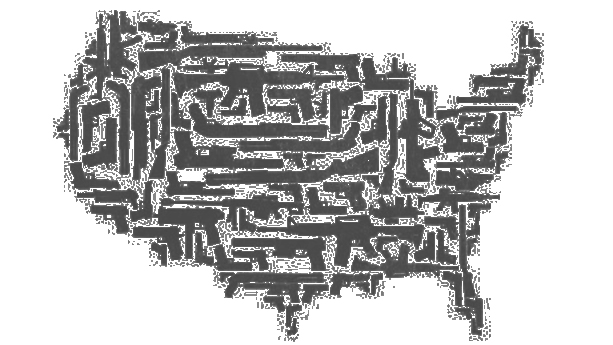Signs of the Times • 21 June 2017 • No. 124
¶ Processional. “We Are Not Alone,” Sharon Mennonite Bible Institute Singers.



Why not go out on a limb? That's where the fruit is. — Will Rogers
Signs of the Times • 21 June 2017 • No. 124
¶ Processional. “We Are Not Alone,” Sharon Mennonite Bible Institute Singers.

by Ken Sehested
Recently, when Nancy picked up our 3-year-old grandson Jonathan from preschool, out of the blue he said, “Ja-Ja (her grandmotherly nickname), e e cummings wrote poem.”
“Did you learn that at school, Jay?” Nancy asked. “No,” he said from the back seat.
Read more ›by Ken Sehested
We are a nation awash in guns, increasingly inured to violence that doesn’t happen on our street or zip code or time zone, and increasingly addicted to militarized response to threat at home and, especially, abroad. The  recent shooting of legislators in a public park, of those practicing for a charity baseball game, could be a teachable moment in how we might disentangle ourselves from these deathly habits.
recent shooting of legislators in a public park, of those practicing for a charity baseball game, could be a teachable moment in how we might disentangle ourselves from these deathly habits.
Will it?
Read more ›Signs of the Times • 13 June 2017 • No. 123
¶ Processional. “Who We Are,” Gungor (4:05 video. Click the “show more” button to read their commentary).

Ken Sehested
Texts: Genesis 21:8-21; Psalm 86:1-10; Jeremiah 20:7-13; Romans 6:10-11; Matthew 10:24-39
Circle of Mercy, 19 June 2005
In case you missed it, it’s power-tool weekend across the nation. Father’s Day, that bastard child of a holiday, commemorated only slightly more than President’s Day. My best gift was the arrival this past week of my first-born, Jessica, and her beloved, Rich. They’ve moved to Asheville, living with us for the time being, and I couldn’t be happier.
Like most holidays, Father’s Day has its competing histories. The dominant one seems to be the story of Sonora Smart Dodd, a woman who in 1909 wanted to honor her father, a Civil War veteran whose wife died giving birth to their sixth child. Ironically, Ms. Dodd came up with the inspiration after hearing a Mother’s Day sermon in her church and later convinced her pastor to dedicate a Sunday to fathers. Later U.S. presidents endorsed the idea, with Lyndon Johnson signing a declaration in 1966 and, in 1972, Richard Nixon signing legislation making it a permanent holiday. Some say his action was to distract the nation’s attention away from information then emerging from a secret source who, until a few weeks ago, was known only as “Deep Throat.”
Read more ›by Ken Sehested
While the nation’s eyes were recently glued to the former FBI Director James Comey’s testimony before the Senate Intelligence Committee hearings, the House of Representatives quietly passed the Financial Choice Act which rolls back much of the 2010 Frank-Dodd Wall Street Reform and Consumer Protection Act, enacted to prevent another round of reckless behavior by banks and other major financial institutions that created the Great Recession of 2007.
§ § §
Read more ›Hahn’s book is 20+ years old but this reflection on the kinds of leadership required in the church was useful to me halfway through a 20-year pastoral assignment and now at the end of a part-time interim pastorate that called for an initial two months and has now extended to over ten years. While Hahn reflects biblical, theological and psychological perspectives, her major contribution lies in her reliance on concrete experiences and parish interview responses.
Hahn identifies four sources of authority (authority: ‘the permission and/or obligation to act/, p 7): authority is given and therefore received; authority is an inner awareness of calling; authority is a personal assertion; authority comes from many sources integrated, and from G-d (pp 8-10). She names this ‘integrated authority’: a meeting of person, context, initiative and the transcendent’ (p 10).
Authority is not a control mechanism; it is a gift for the community, not a personal possession to be employed for personal benefit. Integrated authority is ‘integration’, the mediation of expectations; it belongs to G-d; it doesn’t depend on control; it does not practise hierarchy; it honours the freedom of others. Integrated leaders invite others’ authority to be exercised: start with the people where they are; refuse to be others’ authority (during a real game the coach retreats to the sidelines); people are equal; others’ gifts, partnership and authority are invited. (The early church by the fourth century had forsaken Jesus’ vision of integrated authority and slipped back under control mechanisms: authority evolved into a bureaucracy.
Read more ›The World Council of Churches’ Baptism, Eucharist and Ministry (1982) brought communion to the ecumenical fore, especially with the Anabaptist emphasis in the 16th century. “The eucharist is the pinnacle of the communion of the church and the Christian, yet its transcendent reality is affected by the rudimentary elements of earthly existence, bread and wine. . . . The eucharist forces us to think about communion with a spirit, unbounded in any way yet mediated by the earthbound elements of natural existence” (p. 25). “In Jesus G-d took flesh.” Rempel explores how the doctrine of the eucharist was developed by each of three radical reformers: Marpeck, Hubmaier, Dirk, keeping a balance between sacramentalism and spiritualism, being more than just an act of remembrance.
Rempel stresses the commonalities of the three theologians: Christian life is primarily a life of relationship with G-d, i.e., a visible expression; connection between spiritual and material dimensions; the gospel of John was their major gospel; holding together faith and Spirit (Trinitarian emphasis) (pp. 199-201).
Rempel also summarizes four contemporary Anabaptist theologians: J.C. Wenger, Gordon Kaufman, Robert Friedmann and Thomas Finger. Key quotations focus the issue. “The community’s action of sharing bread and wine is transformed into a sharing of the body and blood of Christ” (p. 222). Rempel regrets that for Anabaptists the Lord’s Supper has all to often been an isolated point of doctrine. Anabaptist ecumenical theology emphasizes the Lord’s Supper as reconciliation with G-d and with each other, a sense of community and mission.
Read more ›‘The degradation of nature is not a problem with a short-term solution…. The ecological crisis is a spiritual crisis…. Most of us no longer have a sense of belonging to the earth, an experience of solidarity with plants and animals, such that we deeply desire for all forms of life to thrive along with us.’ (p xiv) With this as the prompting issue, Earth and Word presents a spectrum of sermons that force us to look again at the bible and its message to and for us. There’s a richness in the spectrum of presentations here; virtually none of the ‘sermons’ are superfluous: Wendell Berry (‘Christianity and the Survival of Creation’), Ted Hiebert (‘First Things First’), Cynthia Moe-Lobeda (‘Dry Bones’), Larry Rassmussen (‘First and Everlasting Covenant’), Rosemary Radford Ruether (‘The biblical vision of Eco-Justice), Joseph Sittler (‘The Care of the Earth), Barbara Brown Taylor (‘Rest for the Land’), to name only a few entries.
It is impossible to summarize the riches of these sermons, but typical is Ched Myers’ ‘The Cedar has fallen: the Prophetic Word versus Imperial Clear-Cutting’; Myers traces the ecological disaster of the clear cutting of Lebanon’s cedars with a moving litany from the bible itself, with the political implications (‘there was blood on the cedars that figured so prominently in Solomon’s temple and his own royal house’ (p 217), the cedars a metaphor for empire itself. ‘The bible takes sides on behalf of the trees’ (p 222).
Vern Ratzlaff is a pastor and professor of historical theology at Lutheran Theological Seminary in Saskatoon, Saskatchewan, Canada.
Read more ›Moral differences (on issues such as abortion, capital punishment, immigration and civil rights) make it difficult to seek the common good. The western world has been influenced by the examples of its Jewish-Christian past where the Hebrew prophets were seen as pointing to the identifying and seeking to correct social evils. In our pluralistic society, the prophetic method employs ‘the fiery rhetoric of indictment.
These Jeremiads (identifying Jeremiah’s fiery denunciations) have been a major influence on public discourses (Martin Luther King Jr who used prophetic rhetoric to facilitate reform and reconciliation rather than revenge.’ True prophets believe they must do as G-d commands and condemn the practices G-d tells them to condemn’ (p 8). But is it possible to incorporate a lively sense of humility into the practice of the jeremiad?”(p 9).
'The greatest danger associated with the practice of prophetic indictment is arrogance [and Kaveny] uses Lincoln’s Second Inaugural Address for insight about how to combine a strong commitment to combating social evil with a vivid sense of the inadequacy of one’s own grasp of divine plans for dealing with that evil. [Lincoln] offers a lesson on how modern day jeremiads might integrate self criticism into their thought and speech.’ (p 9). Kaveny does a fascinating study of Jonah as one reminder to those who issue prophetic indictments when they know so little about G-d’s plan….and that the biblical tradition offers ample room for the cultivation of humility and self criticism’ (p 10).
Read more ›Subscribers receive full access to the entire prayer&politiks site. It’s free. Each week you will receive an automated email with a link to the new edition of the Signs of the Times column. All you provide is you name, email address and city, state or province, and country. This information is never shared with any other party. The only other agreement you make is to receive two solicitation letters per year, one in the spring, the other in the fall. (Which you are free to ignore. Your subscription is still free, and you may “unsubscribe” at any time.) This is our modern begging-bowl. Contributions are our sole source of support.